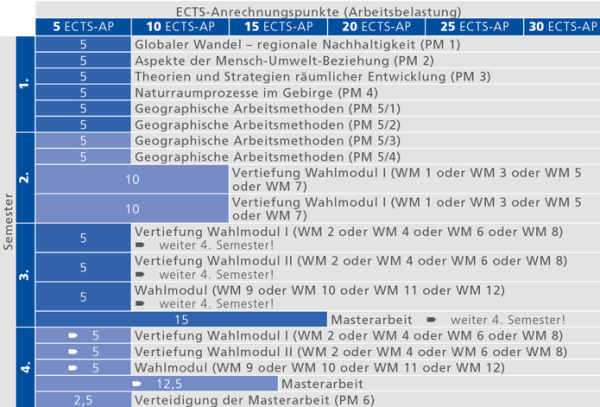Masterstudium Geographie: Globaler Wandel – regionale Nachhaltigkeit
Curriculum (2015W)
Master of Science
Dauer/ECTS-AP
4 Semester / 120 ECTS-AP
Studienart
Vollzeit
Unterrichtssprache
Deutsch
Voraussetzung
Fachlich infrage kommender Bachelorabschluss oder Äquivalent und Sprachnachweis
Fakultät
Fakultät für Geo- und Atmosphärenwissenschaften
Niveau der Qualifikation
Master (2. Studienzyklus)
ISCED-11: Stufe 7, EQR/NQR: Stufe 7
ISCED-F
0532 Geowissenschaften
Studienkennzahl
UC 066 855
Das Curriculum ist die Grundlage eines Studiums und vermittelt einen detaillierten Überblick zum Aufbau, zum Inhalt, zur Prüfungsordnung und zum Qualifikationsprofil.
Mittels Curriculum können mehrere wichtige Fragen bereits vor Studienbeginn geklärt werden: welche Zulassungsvoraussetzungen gelten für das Masterstudium Geographie: Globaler Wandel – regionale Nachhaltigkeit, wie lange dauert das Studium, welche Module müssen absolviert werden etc.
Für das Masterstudium Geographie: Globaler Wandel – regionale Nachhaltigkeit gilt aktuell das Curriculum 2015W.
Informationen zum Curriculum (2015W)
Die Gesamtfassung des Curriculums spiegelt das aktuell gültige Curriculum wider, ist rechtlich unverbindlich und dient lediglich der Information. Die rechtlich verbindliche Form des Curriculums inkl. etwaiger Änderungen finden Sie in den entsprechenden Mitteilungsblättern.
Die Information, welche Curriculumsversion für Sie gilt, entnehmen Sie bitte Ihrem Studienblatt
abrufbar unter: https://lfuonline.uibk.ac.at/public/lfuonline_meinestudien.studienblatt
Spalte: Curriculum in der geltenden Fassung
- Curriculum/Gesamtfassung (ab 01.10.2019)
- Mitteilungsblatt vom 28.06.2019, 66. Stück, Nr. 584 (Änderung des Curriculums)
- Mitteilungsblatt vom 03.06.2015, 62. Stück, Nr. 459
Voraussetzung
Fachlich infrage kommendes Bachelorstudium an der Universität Innsbruck:
- Bachelorstudium Geographie (2015W)
- Bachelorstudium Geographie (2010W)
- Bachelorstudium Geo- und Atmosphärenwissenschaften
Nachweis der Allgemeinen Universitätsreife.
Die allgemeine Universitätsreife für die Zulassung zu einem Masterstudium ist durch den Abschluss eines fachlich in Frage kommenden Bachelorstudiums, eines anderen fachlich in Frage kommenden Studiums mindestens desselben hochschulischen Bildungsniveaus an einer anerkannten inländischen oder ausländischen postsekundären Bildungseinrichtung oder eines im Curriculum des Masterstudiums definierten Studiums nachzuweisen. Zum Ausgleich wesentlicher fachlicher Unterschiede können Ergänzungsprüfungen (maximal 30 ECTS-AP) vorgeschrieben werden, die bis zum Ende des zweiten Semesters des Masterstudiums abzulegen sind. Das Rektorat kann festlegen, welche dieser Ergänzungsprüfungen Voraussetzung für die Ablegung von im Curriculum des Masterstudiums vorgesehenen Prüfungen sind.
Im Zuge des Nachweises der Allgemeinen Universitätsreife wird jedenfalls die Absolvierung folgender Kernbereiche im Rahmen des abgeschlossenen Bachelorstudiums geprüft:
- in Bearbeitung
Empfohlener Studienverlauf
Der unten angeführte, exemplarische Studienverlauf gilt als Empfehlung für Vollzeitstudierende, die das Studium im Wintersemester beginnen. Die Aufstellung dient der Darstellung eines möglichen Studienablaufs und ist nicht verpflichtend. Etwaige Prüfungswiederholungen bzw. deren studienzeitverzögernde Wirkung sind nicht berücksichtigt.
Die Regelstudienzeit beträgt 4 Semester bzw. 120 ECTS-AP, wobei gemäß Universitätsgesetz die Arbeitsbelastung eines Studienjahres 1.500 (Echt-)Stunden zu betragen hat und dieser Arbeitsbelastung 60 Anrechnungspunkte zugeteilt werden (ein ECTS-Anrechnungspunkt entspricht einer Arbeitsbelastung der Studierenden von 25 Stunden).
5,0 ECTS-AP: Globaler Wandel – regionale Nachhaltigkeit (PM 1)
5,0 ECTS-AP: Aspekte der Mensch-Umwelt-Beziehung (PM 2)
5,0 ECTS-AP: Theorien und Strategien räumlicher Entwicklung (PM 3)
5,0 ECTS-AP: Naturraumprozesse im Gebirge (PM 4)
5,0 ECTS-AP: Geographische Arbeitsmethoden (PM 5/1)
5,0 ECTS-AP: Geographische Arbeitsmethoden (PM 5/2)
5,0 ECTS-AP: Geographische Arbeitsmethoden (PM 5/3)
5,0 ECTS-AP: Geographische Arbeitsmethoden (PM 5/4)
10,0 ECTS-AP: Vertiefung Wahlmodul I (WM 1 oder WM 3 oder WM 5 oder WM 7)
10,0 ECTS-AP: Vertiefung Wahlmodul II (WM 1 oder WM 3 oder WM 5 oder WM 7)
5,0 ECTS-AP: Vertiefung Wahlmodul I (WM 2 oder WM 4 oder WM 6 oder WM 8) > weiter im 4. Semester
5,0 ECTS-AP: Vertiefung Wahlmodul II (WM 2 oder WM 4 oder WM 6 oder WM 8) > weiter im 4. Semester
5,0 ECTS-AP: Wahlmodul (WM 9 oder WM 10 oder WM 11 oder WM 12) > weiter im 4. Semester
15,0 ECTS-AP: Masterarbeit > weiter im 4. Semester
5,0 ECTS-AP: Vertiefung Wahlmodul I (WM 2 oder WM 4 oder WM 6 oder WM 8)
5,0 ECTS-AP: Vertiefung Wahlmodul II (WM 2 oder WM 4 oder WM 6 oder WM 8)
5,0 ECTS-AP: Wahlmodul (WM 9 oder WM 10 oder WM 11 oder WM 12)
12,5 ECTS-AP: Masterarbeit
2,5 ECTS-AP: Verteidigung der Masterarbeit (PM 6)

| Semester | ECTS-AP | Titel |
|---|---|---|
Erweiterung des Studiums
Im Rahmen dieses Studiums kann das Erweiterungsstudium Entrepreneurship im Umfang von 45 ECTS-AP oder das Erweiterungsstudium Informatik im Umfang von 60 ECTS-AP absolviert werden. Die Zulassung zur Erweiterung setzt die Zulassung zu einem oder den bereits erfolgten Abschluss eines ausgewählten Studiums voraus. Weitere Informationen sind abrufbar unter:
Informationen zur Prüfungsordnung inkl. Bewertung und Benotung
Prüfungsordnung
Die Prüfungsordnung ist integraler Bestandteil des Curriculums, detaillierte Informationen finden Sie unter dem Paragrafen Prüfungsordnung.
Bei der Notenverteilungsskala handelt es sich um die statistische Darstellung der Verteilung aller positiv absolvierten Prüfungen, die innerhalb eines Studiums bzw. eines Studienfaches (unter Heranziehung aller gemeldeten Studierenden eines Studiums bzw. eines Studienfaches) erfasst wurden. Die Notenverteilungsskala wird in regelmäßigen Abständen aktualisiert.
| A | B | C | D | E |
|---|---|---|---|---|
| Österreichische Notenskala | Definition | %-Satz | ||
| 1 | SEHR GUT: Hervorragende Leistung | 34,7 | = 100% | |
| 2 | GUT: Generell gut, einige Fehler | 35,3 | ||
| 3 | BEFRIEDIGEND: Ausgewogen, Zahl entscheidender Fehler | 18,5 | ||
| 4 | GENÜGEND: Leistung entspricht den Minimalkriterien | 11,5 | ||
| 5 | NICHT GENÜGEND: Erhebliche Verbesserungen erforderlich, Erfordernis weiterer Arbeit |
Dezember 2021
Gesamtbeurteilung der Qualifikation
Nicht zutreffend
Erklärung: Eine Gesamtbeurteilung (mit Auszeichnung bestanden, bestanden, nicht bestanden) wird nur über eine studienabschließende Prüfung, die aus mehr als einem Fach besteht, vergeben (im Curriculum dieses Studiums ist diese nicht vorgesehen).
Formulare
- Prüfungsprotokoll
- Anmeldung der Masterarbeit
- Beurteilung des Pflichtmoduls: Vorbereitung Masterarbeit
- Deckblatt der Masterarbeit
- Eidesstattliche Erklärung (der Masterarbeit beifügen)
- Einreichung der Masterarbeit
- Sperre der Masterarbeit
- Antrag um Zulassung zur dritten und vierten Wiederholung einer Lehrveranstaltungsprüfung
Anerkennungen
Kontakt und Information
Prüfungsreferat
Standort Innrain 52d
Studienbeauftragter (ab 01.03.2024)
Dr. Rudolf Sailer
Studiendekanin (ab 01.03.2024)
Priv.-Doz. Mag. Dr. Gertraud Meißl
Informationen zum Studium
- Fristenregelung
- Richtlinien zur elektronischen Einreichung und Veröffentlichung von wissenschaftlichen Arbeiten und Merkblatt der ULB
